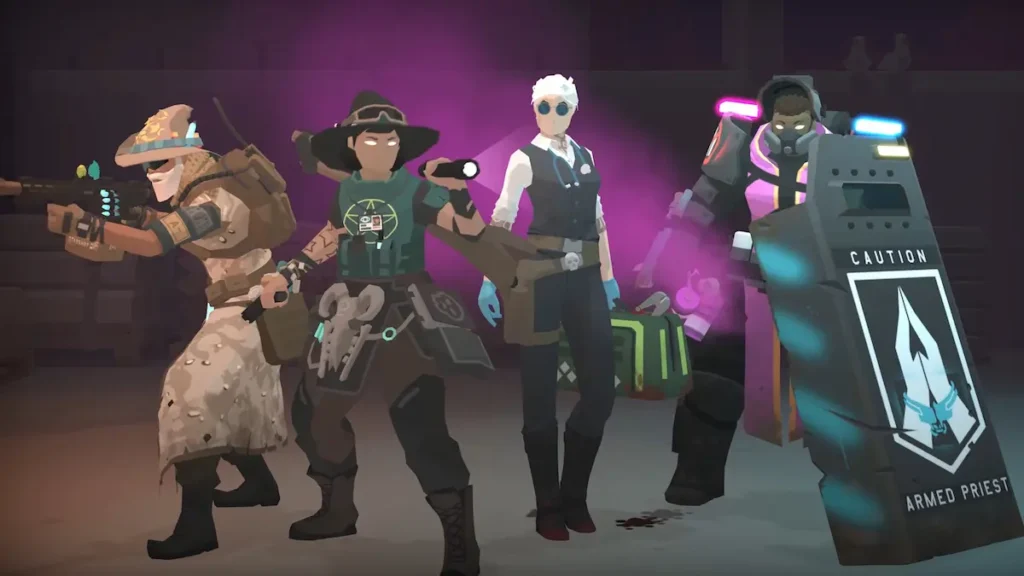Tactical Breach Wizards is a single tactical game that appeals to both tactics’ enthusiasts and those typically opposite to the genre. It skillfully balances the tension and precision of tactical gameplay with a light-hearted, humorous approach, creating an experience that is both demanding and accessible.
Set against a backdrop of conspiracies, private military companies (PMC’s), and theocratic dictatorships, the game’s narrative is rich and interesting.
Yet, it’s the peculiar elements like a traffic-summoning warlock named Steve in a hi-vis robe – that make Tactical Breach Wizards truly stand out.
The game is designed to make that perfect, ridiculous XCOM turn repeatedly, while also assuring players that it’s perfectly okay if things do not go as planned. This balance makes it one of the most fun tactics games, giving both challenge and flexibility.
A unique feature is the ability to foresee the consequences of every action before committing to it, letting the players to rewind and rethink their strategy. This mechanic adds an element of experimentation and reduces the frustration often associated with tactical games.
The story gets started with a bang – literally – when a door is blasted open, signaling the start of a hostage rescue mission by the Navy Seer team. The game quickly establishes its tone, mixing serious tactical scenarios with humorous, offbeat characters.
Liv Kennedy, for example, finds herself in a tough spot early on, requiring Zan Vesker to foretell the future to determine the best course of action. This ability to predict and adjust outcomes is central to the gameplay, making every decision feel weighty yet manageable.
As the narrative uncovers, the game brings in more characters, like storm witch and private investigator Jen Kellen, whose casual approach to a sudden office fire adds to the game’s strange charm.
The story then spirals into a global conspiracy, taking the team to various locations across the world. In spite of the complex narrative, the game remains accessible, thanks in part to its forgiving gameplay mechanics that allow players to rewind and re-strategize.
During the start, the missions in Tactical Breach Wizards may seem like discrete, solvable puzzles, but as players progress and unlock new abilities, the game encourages more improvisational play.
With each mission, players are tasked with juggling multiple threats and objectives, often leading to a series of happiness, spontaneous actions.
The game’s open-minded playfulness is balanced by tricky goals and the need to prioritize threats, making sure that while players have the freedom to experiment, they must still think critically to succeed.
The game also gives optional objectives that serve as creative prompts, motivating players to think outside the box. These challenges, like completing a mission in three turns or defenestrating foes, add an extra layer of depth to the gameplay.
Finishing the challenges rewards the players with “confidence”, a resource used to unlock new outfits for the team, further focusing on the game’s style and self-expression.
In spite of its playful nature, Tactical Breach Wizards does not shy away from presenting satisfying tactical depth. Players must stretch each action point as far as possible, using their full arsenal of abilities to achieve the cleanest, most efficient plays.
The game motivates this deep engagement without relying on punishing difficulty, making it accessible to a wide audience.
Conclusion
The game’s development is marked by new difficulties, like alarms and locked doors, as well as enemies with unique skills that require fresh strategies.
These elements keep the gameplay dynamic and engaging, ensuring that players are constantly adapting and refining their approach. The game’s “human” feel is not just in its storytelling but also in its skills to evolve and surprise players at every turn.
While Tactical Breach Wizards is not without its flaws—some abilities are overly useful, and the ending missions may prioritize story over challenge—it remains an incredibly enjoyable experience.
The game’s flexibility, humor, and depth make it a unique in the tactical genre, giving an amazing combination of strategy and playfulness that will keep players coming back for more.
Also read: Once Human Review: A New Twist on Survival Crafting

